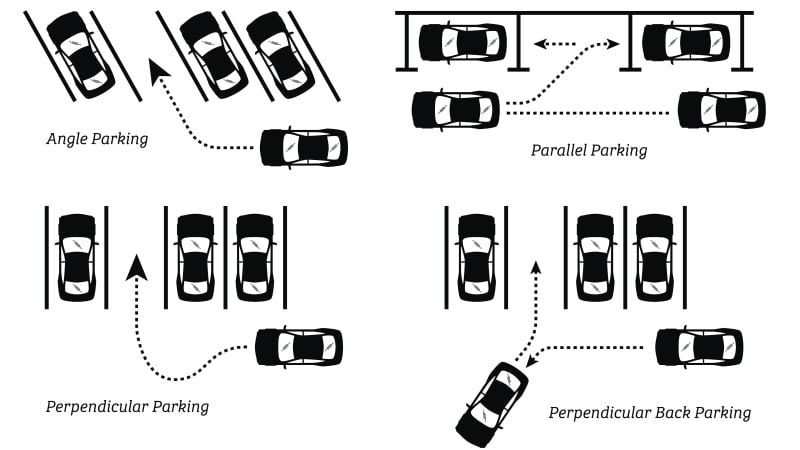Zen and the art of parking a car

Our cars rock a lot of tech, and while some of it is neat, some of it is silly and even insults our intelligence.
One small example: a car’s ability to park for you automatically, either parallel parking or perpendicular.
First, it’s hard to believe anybody actually uses it. Why would someone with parking chops bother? By the time you fiddle around setting up the thing, you could be parked already. I’ve never tested this feature on a press vehicle, because who cares. It exists on a personal vehicle and has gone unused there, too. Sadly, some portion of my car purchase price paid for it.
So, I have no idea if it actually works, but let’s assume it performs brilliantly. It’s still a small affront.
What is the most feared part of a DMV driving test? Parallel parking. And rightly so, because what’s the part most new drivers flunk? Parallel parking. What do some drivers with years of experience still seem to struggle with? Parallel parking. Heck, some people aren’t even particularly good at getting between the lines of a perpendicular space.
Your response might be, hey, that’s the argument favoring this feature: Here’s a task some people struggle with, and here’s a marvelous technological solution to their problem. But it’s not a solution — it facilitates their problem, allows it to go unaddressed.
JFK called for doing things “not because they are easy, but because they are hard.” Automatic parking is taking the easy way out.
Why is parallel parking even on driving tests? Because it reveals whether a driver has fine control over their vehicle; has a spatial awareness of the dimensions of the car and its surroundings; and that they understand the geometry involved in maneuvering it. Parking tests competency, mastery of the machine. If a driver can’t manage this small, low-speed bit of stationkeeping, how well will they execute the high-stakes stuff they’ll encounter out on the road?
Maybe parking and other driving tasks are menial, but they’re also a privilege.
This came to mind because I’ve been training a teenage driver, and one of the trickiest lessons for her was the concept that the back wheels are the pivot point for close-quarters maneuvers. This also applies to squaring off turns, avoiding curbs, not running over my sprinkler heads, etc., so it’s an important concept. She actually does great when driving on roads and highways, but until she can place a vehicle precisely within inches of where it needs to be, she’s not yet in full control.
This is the greater autonomy question writ small — automakers and tech companies are vying to make autonomy happen, but a lot of us are uninterested. How many Autoblog readers are comfortable ceding control of their vehicle … in any way, ever? You like to drive, and as one small part of that, you probably take pride in your parking skills. Maybe autonomous features, either full self-driving or little functions like this, will someday live up to the hype and give us safer roads (or in this case, parking lots?). But they rob something from us.
Parking provides an eternally fresh series of opportunities for small victories in life. Every parking spot presents its own set of problems, and even the most skilled driver sometimes has to scrap the first attempt and try again. If you like to do Wordle or the NYT crossword, parking is another kind of puzzle that’s fun to solve.
Maybe you’re a technophile, and you think it’s cool to push a button, have your car run on “Autopilot” or whatever and be all magical. That might be fun for a while, but it’s ultimately hollow. A novelty, not an accomplishment. Not your accomplishment, anyway.
Contrast the automatic parking button with a different parking technology — front and back sensors. Those are an absolute pleasure, and here’s the difference: The sensors offer convenient information, but you execute the maneuver. They don’t take the controls out of your hands.
We could go off on a tangent here about other technologies such as Tesla Summon (geez, you can’t hoof it a few steps?) or automated trailer-backing. But that’s niche. Few drivers need to back a trailer; everybody needs to know how to park.
Automakers will dream up all kinds of features if we pay for them. I sometimes wish they would just stop. How soon before we no longer have to do anything ourselves, before there are no more challenges to rise to? No shifting gears, no looking over our shoulders, no monitoring closing speeds, no parking worries. A life of pure convenience. Just like that spaceship full of bloated, coddled passengers in Pixar’s “Wall-E.”
Nothing about driving, even how you park, should be taken lightly. Anything you do behind the wheel risks yourself and others. That’s sobering. But it makes you feel alive.
Maybe parking and other driving tasks are menial, but they’re also a privilege. In Zen practice, menial chores are a form of meditation. They are the pathway to enlightenment. No act is too small not to be done with humility and care. A smartly executed parallel parking job feels good, right? It’s a tiny, shimmering moment when you applied your mind and your skill and succeeded.
We need more of those moments, not fewer. Why push a button and erase one of life’s little pleasures?



